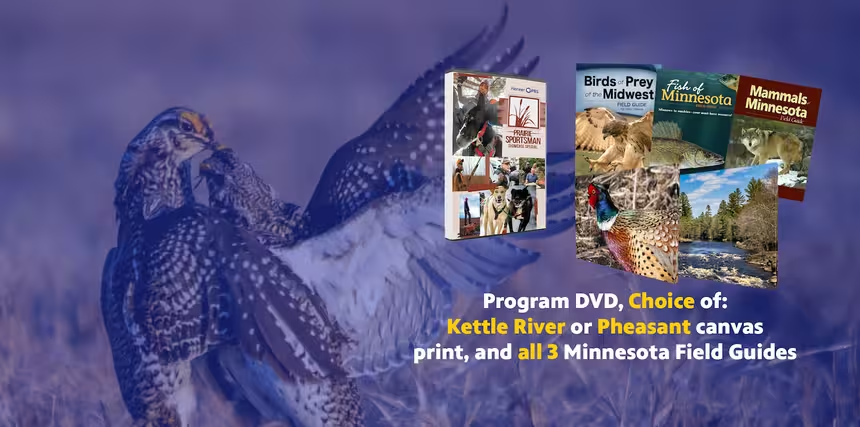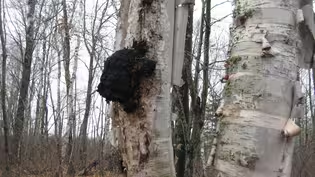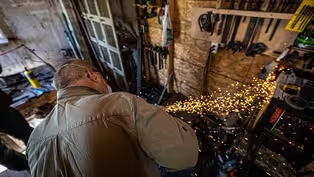Prairie Sportsman
Forging Ahead
Clip: Season 14 Episode 9 | 10m 27sVideo has Closed Captions
Minnesota blacksmith Scott Wendt handcrafts unique knives, turning his passion into healin
In a small Minnesota community, Scott Wendt, a former law enforcement officer, finds healing and purpose in blacksmithing. After a life-threatening illness, Wendt started forging metal as a form of physical therapy.
Problems playing video? | Closed Captioning Feedback
Problems playing video? | Closed Captioning Feedback
Prairie Sportsman is a local public television program presented by Pioneer PBS
Production sponsorship is provided by funding from the Environment and Natural Resources Trust Fund and Shalom Hill Farm. Additional funding provided by Big Stone County, Yellow Medicine County, Lac qui...
Prairie Sportsman
Forging Ahead
Clip: Season 14 Episode 9 | 10m 27sVideo has Closed Captions
In a small Minnesota community, Scott Wendt, a former law enforcement officer, finds healing and purpose in blacksmithing. After a life-threatening illness, Wendt started forging metal as a form of physical therapy.
Problems playing video? | Closed Captioning Feedback
How to Watch Prairie Sportsman
Prairie Sportsman is available to stream on pbs.org and the free PBS App, available on iPhone, Apple TV, Android TV, Android smartphones, Amazon Fire TV, Amazon Fire Tablet, Roku, Samsung Smart TV, and Vizio.
Buy Now

Prairie Sportsman Premium Gifts
To order, email yourtv@pioneer.org or call 1-800-726-3178.Providing Support for PBS.org
Learn Moreabout PBS online sponsorship- [Bret] A hardened piece of steel forged in fire, sharpened by hand.
Knives have come a long way since humans first sharpened stones and are now considered one of the most important tools ever created.
(thrilling mystical battle music) Today the idea of handmade knives and tools is left to a select few who find pride in self-sustainability.
And the ability to create, the process itself can also give people a way to heal.
- Basically, my pancreas blew up or started leaking.
The enzymes that digest your food began to digest my internal organs.
- [Bret] For one Minnesota man, the idea of becoming a blacksmith and creating unique, one of a kind knives became an obsession.
(thrilling mystical battle music) (country violin music) In the small Minnesota community of Big Bend, you'll find Scott Wendt sweating out the heat in his shop.
But it's not the hot summertime sun causing the mercury to rise.
It's a gas forge where Scott makes knives and an assortment of other objects.
- How the forge works is just on a Venturi system, air, oxygen and gas.
And then what it does, it forces this hot gas into flame down into this chamber.
- [Bret] Scott has made over 1000 knives.
And while he enjoys the craftsmanship, he didn't always want to be a blacksmith.
- I wouldn't describe myself as a professional blacksmith by any means, I'm a hobbyist.
It's more of an obsession than it is a profession.
I've been pretty fortunate in my life.
I've had four lifetimes.
My first 18 years I grew up on a dairy farm, rode horse every day.
My dad probably doesn't know this but I used to let the young cattle out just so I could take my horse, go find them and round them up and bring them back.
When I turned 18, I went to college for law enforcement and I was a state trooper and a police officer for the next 34 years.
And then at 2011, when this illness came, I had to retire.
Looking for something to do, and Bruce Ferguson from the Montevideo High School hired me to be an aide.
And then he mentored me into being a success coordinator.
I worked with kids for nine years, helping them get their homework done, building relationships with them.
So that was my third lifetime.
And then I turned 62 and I retired.
And now I'm kind of doing this blacksmith and thing full-time.
(light Chinese melody) In 2011, I had necrotizing pancreatitis, ended up in the hospital for almost 10 months.
And I lost more than half my body weight.
I got down to 140 pounds.
They wanted me to go to the gym and work out.
And I had this external drain bag and I wasn't gonna do that.
And my son sent me a video and he said, "Hey dad, I think you'd like to do this.
This guy built a forge out of a brake drum."
Still have the brake drum, coal forge, "And he uses that."
He said, "I think you might like doing that.
You can just gets some frustration out by beating steel."
And so I did.
And when I first started, like I said- - Did that work?
- It worked, it did.
It got rid of some of my frustrations.
It also gave me the exercise.
I started out with like a half ounce or a half a pound hammer.
And I would forge for maybe 20 minutes.
And I didn't have enough energy to go to the house.
I'd have to call my wife on the cell phone, she'd have to come down and carry me back to the house basically.
Well, this went on and I got better at it.
And what started out as a way to help my health turned into an obsession.
(dramatic music) (Chinese melody music) (beating drums) (hammering slamming) - Did you just feel achy or what?
- Yeah, I just had severe pain.
I woke up, I was gonna go to work and I had a pain in my upper stomach.
I'd been fighting this pain for a while.
Six, seven months going to the doctor on and off and they really weren't sure what it was.
And then that morning, January 6th, 2011, I woke up, I knew I couldn't go to work.
But I thought, well, maybe if I just wait a little while it'll get better.
By 10 o'clock in the morning.
I knew I wouldn't even be able to drive myself to the hospital.
I was in so much pain.
They took me to Willmar.
I was in Willmar for, I don't know, a week or something.
Don't know any of it.
I was gone, in a coma.
- You were in a coma?
- Yeah, they flew me, it was a drug induced coma I think so I didn't feel that pain.
And then they flew me to Rochester.
And then I was there from January 11th until finally the end of September, early October, I was able to come home and- (thrilling music) I'd went to this surgeon.
I'd lost all this weight and I went to the surgeon and the surgeon said, "You're not a candidate for surgery.
Why don't you go on home?"
Telling me, "Okay, you need to get your affairs in order."
I came home, I had a horse at that time.
I worked with that horse a little bit.
It was just nice to get home.
After about six weeks he said, "Mr. Wendt, how are you doing?"
I said, "I think I'm getting better."
He said, "Well, why don't you come on over here, we'll do some tests."
Go back, the same surgeon that told me that I was no longer a candidate for surgery said, "I don't know what happened.
Your body healed itself," for the most part.
So I started out with this and this is what I made.
Just these S hooks.
And I made probably two five gallon buckets full before I got one that I liked.
I was terrible at it but I didn't give up.
I just kept going and going.
- [Bret] The exercise was healing his body and the accomplishments were healing his mind.
- To be able to take a piece of steel that looks almost like this and turn it into this with just your hand, hammer, anvil and a forge.
It's my sweat and I have blisters and burns and what have you from doing this stuff by hand.
So it's just that sense of pride you get that you're able to do something that 20% of the population probably couldn't do so.
- What did you make that you were so proud of that you said, "Yeah, I wanna keep doing this.
I really like this."
- I started out making railroad spike knives just like every other blacksmith in the country.
And when I switched over and started making knives and all of a sudden I've got compliments.
Guys would send me pictures that they'd been out to Montana elk hunting or they'd been out to Wyoming antelope hunting.
And they had my knife and they butchered the deer with something that I made with my hand.
And they were thanking me and saying, that got me going.
- [Bret] Most knives will take Scott 7 to 10 days to complete.
But he does some special orders that take a little more time.
- If there's a law enforcement officer, fireman, EMS, military, their spouse will send me their uniform.
And then I make the handle out of that.
So they'll have a knife, a blade that's forged.
The handle is made from a uniform that they wore during their service.
(tribal music ) (thrilling music) - [Bret] As a member of law enforcement, his interactions with teenagers weren't always positive.
But working in the schools for nine years changed his attitude.
- I always say those kids saved my soul.
- [Bret] One day those kids that he worked with needed a project.
So they built him a gas forage that he still uses today.
- So it's kind of cool.
I still have the forge that my kids built.
- Did you ever think you'd get to this point way back when you were looking for something to do and you beat on a brake drum?
- Never, never.
My entire purpose when I started was to develop my muscle tone back.
That was it.
And then I thought I'd go back to being a farmer.
- How cool is it to be able to take something that was probably destined for a scrapyard and turn it into something beautiful?
- Yep, the best part of working with steel is some of this steel came from the ground in Northern Minnesota, taconite iron ore. Got shipped out to Pittsburgh, Pennsylvania, they turned it into steel, got shipped somewhere else, turned into leaf spring, put in a car, ended up back in a scrapyard in Minnesota.
And now I'm gonna make a knife out of that ore that came out of our ground.
Yeah, it's cool.
I get kids in here, my grandson is gonna be a blacksmith.
That's all he wants to do.
He's seven years old and he comes down here and pound stuff out.
But he knows the history.
He knows that this steel very possibly could have came from the ground in Northern Minnesota.
So next summer I'm gonna take him up to the mines, take him down in the mines so he can see where they got the steel that he's gonna pound out his knife with.
- That's cool.
- Yeah.
(mythical battle music) Like I said, I put my name on it.
A hundred years from now, somebody's gonna look at that knife and say, "Who's S.Wendt?"
You know, who's that guy?
(mythical battle music) - [Bret] Scott's knives are a functional piece of Minnesota artwork that doubles as a unique form of recycling.
They sell for between $25 and $65, unless it's a custom job.
They can be found at Hunted Treasures in Watson, Minnesota or by emailing wendtsforge@gmail.com.
(mythical battle music)
Video has Closed Captions
Clip: S14 Ep9 | 2m 51s | Join Gentleman Forager Mike Kempenich on a quest for rare chaga mushrooms in Minnesota. (2m 51s)
Fast Forage: Chanterelle Mushrooms
Video has Closed Captions
Clip: S14 Ep9 | 5m 35s | Forager Nicole Zempel shares tips on finding and enjoying chanterelle mushrooms sustainabl (5m 35s)
Preview: S14 Ep9 | 30s | Knifemaker Scott Wendt and foraging for chaga and chanterelles. (30s)
Providing Support for PBS.org
Learn Moreabout PBS online sponsorship
- Science and Nature

Explore scientific discoveries on television's most acclaimed science documentary series.

- Science and Nature

Capturing the splendor of the natural world, from the African plains to the Antarctic ice.












Support for PBS provided by:
Prairie Sportsman is a local public television program presented by Pioneer PBS
Production sponsorship is provided by funding from the Environment and Natural Resources Trust Fund and Shalom Hill Farm. Additional funding provided by Big Stone County, Yellow Medicine County, Lac qui...





